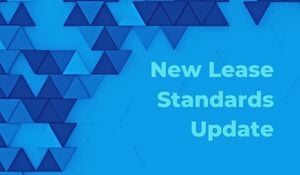The accounting lease standard, a topic of discussion since 2016, was postponed several times due to continued debate and COVID accommodations, but it is finally here. For privately held companies and organizations required to produce GAAP financial statements, the update is effective for years beginning after December 15, 2021. This means if you are a calendar year-end entity, the year of implementation will be the year ended December 31, 2022.
The first thing to consider is how this implementation will affect your financial statements.
- With the new standard, substantially all leases new and existing, will need to be added to the balance sheet as a right of use asset and lease liability. Even month-to-month leases or leases without a formal agreement will need to be considered.
- Capital leases will now be considered financing leases and are treated substantially the same as capital leases were under the old standard, with some changes in terminology.
- Operating leases, which were previously only disclosed in the financial statements, will be recorded as a right of use asset and lease liability on the balance sheet. The amount recorded as an asset and liability with be roughly the future monthly payment that are due through the term of the lease, with consideration to time value of money and potential lease extensions.
The next thing to consider is if you have financial covenant, how will this affect those covenants?
Many times, the requirement of GAAP financial statements is accompanied by financial covenants. If your company or organization has long-term leases, multiple operating leases, or high monthly payments, the changes to your financial statements can become significant quickly and have a potential to affect your financial covenants. Some covenants that can be affected are a fixed charge ratio, current ratio, tangible net worth, or debt to equity ratio. If your company or organization has any of these covenants or other covenants that have a calculation including total liabilities, current liabilities or total debt payments, you will need to consider what affect this has on your covenants.
What conversations should I be having with my banker and how can Froehling Anderson help?
If you determine that the new lease standard has a significant effect on your bank covenants that will put your company or organization out of compliance, you will want to start those conversations with your bank right away. You can work with your bank to adjust your covenants to accommodate the new lease liability, exclude the new lease liability or payment from the calculation, or discuss changing the covenant requirements all together. These discussions can get complex and technical quickly, and our accounting professionals would be happy to assist you in these discussions with your bank. Reach out to your accountant at Froehling Anderson to prepare to have a discussion with your banker or email contactus@fa-cpa.com.
Also see the following blogs related to this topic:
What you need to Know About the New Lease Standard
Do I Need to Consider Month-to-Month Leases under the new Lease Standard?


